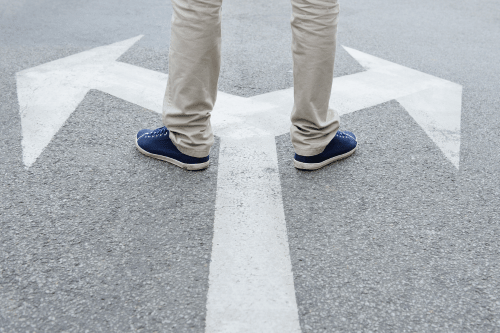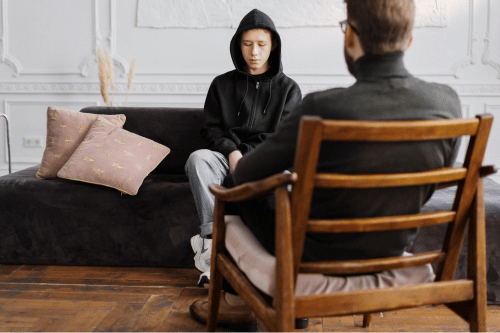Intuition vs Anxiety: How to Tell the Difference and Make Wise Choices
The difference between anxiety and intuition affects every area of our daily lives. These internal signals guide choices, shape emotions, and influence behaviors. But when confused, they can lead to anxiety-driven responses, regret, and negative outcomes.
At Tennessee Behavioral Health, we regularly help clients explore the key differences between their intuitive sense and anxiety. Our clinical experience shows that recognizing each signal’s distinct characteristics helps people make more aligned, authentic choices.
Tennessee Behavioral Health
Understanding Intuition
Intuition is a subconscious process rooted in pattern recognition and inner awareness. It can feel like a calm knowing, a gentle nudge, or a moment of quiet clarity. Unlike fear, intuitive abilities often emerge in silence, not stress.
The intuitive feeling does not rely on logic or facts. It bypasses the conscious mind and moves through bodily sensations, emotion, or instant insight. Some describe it as a deeper sense, a sixth sense, or even an experience of belief without proof.
Characteristics of Intuition
The difference between intuition and anxiety often lies in tone and energy. Intuition is steady and neutral. It may arise during stillness, dreams, or spiritual practice. It often has no emotional charge but still delivers a confident feeling.
Intuitive people tend to recognize these subtle messages more easily. These signals don’t scream—they whisper. The message comes without panic or the need for immediate action.
How Intuition Feels
Physically, intuition creates minimal disturbance. There’s no racing heartbeat, no shortness of breath, no stomach tension. Instead, people report a sense of peace, a soft pull, or a subtle knowing in the body.
It may also show up as a consistent gut feeling that persists even when the mind doubts it. This type of inner cue tends to be stable over time, which is a strong indicator that it’s not reactive fear.
Role in Decision Making
When making decisions, an intuitive sense supports wise choices without forcing outcomes. It is detached from expectation or pressure. Instead, it helps people feel grounded and aligned.
People guided by intuition tend to make authentic choices based on their values, not emotional reactivity. Whether in relationships or career, they trust their internal voice over external chaos.
Understanding Anxiety
Anxiety, on the other hand, is a fear-based response rooted in worry about future danger. It’s often tied to anxious thought patterns, unresolved trauma, or perceived threats. Unlike intuition, anxiety usually comes with urgency, panic, and a strong desire to escape discomfort.
Anxiety manifests through bodily symptoms and cognitive process overload. It clouds clarity and narrows perspective, often leaving people stuck in inaction or misaligned choices.
Characteristics of Anxiety
The distinct characteristics of anxiety include racing thoughts, catastrophizing, and repetitive fear-based predictions. The mind demands concrete evidence or actual proof before acting. The emotional charge is intense and overwhelming.
Common behaviors include avoidance behaviors, safety behaviors, excessive reassurance-seeking, and compulsive checking. These patterns fuel anxiety rather than resolve it.
How Anxiety Feels
The physical sensations of anxiety are unmistakable. These include a racing heart, chest tightness, trembling, nausea, and shallow breathing. A feeling of restlessness, feeling of apprehension, or feeling of worry often accompanies the symptoms.
Some describe a sense of being disconnected or overwhelmed by a sense of urgency. These bodily sensations arise quickly and escalate if not addressed. In chronic anxiety, the body can stay locked in this stress mode for extended periods.
Impact on Daily Life
For many, anxiety affects sleep, relationships, work, and decision-making. It reduces the ability to enjoy life and increases the risk of burnout. The degree of anxiety can also vary from mild to extreme, impacting both short-term actions and long-term goals.
For those struggling with an anxiety disorder, the inner alarm never seems to turn off. This results in avoidance, emotional exhaustion, and poor decisions. Many experience repeated cycles of fear, doubt, and second-guessing.
At Tennessee Behavioral Health, we support individuals who are overwhelmed by anxiety at times, helping them return to clarity through proven therapy models.
Key Differences Between Intuition and Anxiety
The difference between anxiety and intuition becomes clearer when comparing emotional quality and physical response. One empowers, while the other restricts. One feels spacious; the other feels tight.
Emotional Impact Comparison
Intuition produces a calm certainty—even in difficult decisions. It may come with a detached feeling and a quiet clarity. In contrast, anxiety creates negative emotions, anxious feelings, and a sense of unease that does not resolve easily.
Present-Moment Awareness vs. Fear Response
Intuition is grounded in the now. It reflects present-moment awareness and deeper connection. Anxiety projects into the future and reacts to imagined danger through a fear response.
Confidence vs. Uncertainty
An intuitive message feels like a soft “yes” or “no” with a degree of certainty. Anxiety demands control and overthinking. The anxious mind seeks actual evidence to silence fear. This is where the burden of proof overtakes inner clarity.
Tennessee Behavioral Health
Techniques to Differentiate Between Intuition and Anxiety
Learning this challenging practice involves slowing down and examining your thoughts, behaviors, and physical state. It requires self-observation and intentional mental separation.
Self-Reflection Practices
Try a brain dump—writing everything on your mind to release pressure. This helps clear the mental fog and reveal what’s underneath. Ask yourself: Does this feel like a gentle nudge, or is it fueled by fear?
Becoming Aware of Personal Conditioning
Your childhood trauma and past mistakes can cause misfires in your intuition. Anxiety from intuition can arise when fear gets entangled with instinct. Identifying these patterns helps remove the emotional static.
Developing Self-Trust
As you practice listening to your internal voice, you’ll notice when a calm voice speaks versus when a panicked one shouts. Over time, you’ll feel more secure making authentic choices without needing external validation or immediate outcomes.
At Tennessee Behavioral Health, we help people develop discernment abilities through therapy and psychoeducation. Building self-trust is central to this process.
Can Intuition and Anxiety Coexist?
Yes—many people report both. You can have an intuitive feeling that a situation is wrong and still feel anxiety about what happens if you leave. These signals can overlap.
Navigating Coexistence
Notice if the signal comes with urgency, panic, or fear. That’s likely anxiety. If it’s a soft, steady message that returns in moments of stillness, it’s more likely intuition. Anxiety clouds the mind, but intuition speaks when the brain gets quiet.
Real-Life Examples
You might get a job offer that feels off. You notice a persistent feeling of discomfort, even though on paper it looks good. But anxiety kicks in and says you’ll never get another chance. Which do you listen to?
Or you may experience a bit of relationship anxiety while dating someone new. Yet there’s also a sense of peace when you’re with them. Here, sorting fear from truth is critical.
Therapeutic Interventions for Clarity
Professional help can bring clarity to these signals. Many people don’t realize how much anxiety functions in their decision-making. Therapy introduces tools for emotional regulation, thought observation, and body awareness.
Therapy Techniques
Behavioral therapy and Dialectical Behavioral Therapy (DBT) help reframe distorted thinking and break cycles of fear. These evidence-based methods target circular thought patterns and offer strategies like mindfulness, detachment from outcomes, and emotional regulation.
Benefits of Professional Guidance
Therapists offer real-time support in identifying when you’re reacting from fear or responding with insight. The outcome is fewer bad feelings, more confidence, and more life-changing results. For those with commercial insurance, these services are often covered.
At Tennessee Behavioral Health, our licensed clinicians use these interventions to help clients gain a clearer sense of self, reduce symptoms, and make meaningful life changes. You don’t have to sort through this alone.
Practical Applications
Understanding Intuition vs. Anxiety changes how you interact with yourself and others. It affects how you choose relationships, respond to opportunity, and manage uncertainty.
Intuition and Anxiety in Relationships
In love, fear often masquerades as warning. But not every feeling of apprehension means someone is wrong for you. And not every sense of unease means you’re with the wrong person. Pausing to breathe, take deep breaths, and observe can make all the difference.
Making Major Life Decisions
Whether it’s a job change, moving, or leaving a relationship, you may feel both intuition and fear. The key is tuning in to the calm knowing behind the panic. Look for a consistent gut feeling—not a spike in adrenaline. That’s your signal.
Intuition often appears in coincidences in life, repetition, and subtle knowing. Anxiety insists, rushes, and pushes. Learn the language of each.

Tennessee Behavioral Health
FAQ's
Yes, conditions like thyroid disorders or low blood sugar can mimic anxiety through similar symptoms like a racing heart or shortness of breath.
Yes, the more you pause, reflect, and act on intuitive insights, the stronger and more reliable your intuitive abilities become over time.
Yes, for those with anxiety disorders, medication can reduce mental noise and make intuitive signals easier to detect and trust.
Often, yes. Intuitive people tend to notice patterns, emotions, and energy shifts more easily, which can enhance both empathy and internal clarity.








